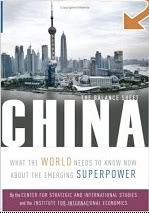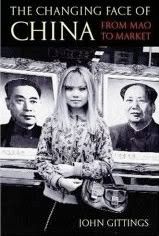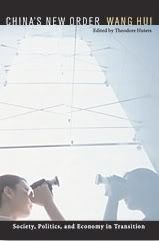Necessary Chinese Illusions
Socialism with Chinese Characteristics
Kim Petersen
There is no calamity greater than lavish desires.
There is no greater guilt than discontentment.
And there is not greater disaster than greed.
Lao-tzu
SARS has raised its infectious head again in southeastern China. The suspected cause is the civet cat, prized for its exotic meat. Chinese officials have ordered the immediate extermination of every captive civet cat in Guangdong province. The civet cat had been pinpointed as the likely source for the human contraction of the SARS corona virus earlier and its capture, sale, and consumption was banned. Business pressures led, however, to the lifting of the ban. Human health concerns were, in essence, trumped by the pursuit of profit. It is emblematic of today’s capitalist China.
At one end of Tiananmen Square, just above the entrance to the Forbidden City, a huge portrait of Mao Zedong, the first leader of the People’s Republic of China, is prominent. Mao represents the victory of socialism over feudalism. Yet the China of today is a far cry from the revolution of the mid-twentieth century. One wonders why the portrait of Mao still features so prominently at Tiananmen Square. A denial of Mao, as many Chinese will tell you, would imply undercutting the legitimacy of the ruling Chinese Communist Party. The upshot of all this is the oxymoronic absurdity of a Communist Party espousing free market capitalism.
A final nail in the Chinese revolutionary coffin was administered late in 2003 when the Communist Party undertook to amend (or more correctly, undermine) the Constitution to protect private property rights. The whole concept that property has rights is ludicrous; everyone understands that property itself has no rights and that what is actually meant is the protection of the rights of ownership to property. Nonetheless the assertion that people have rights to ownership of property is also questionable. The French anarchist Pierre-Joseph Proudhon in his philosophical examination What is Property? concluded that while possession is valid ownership was not. This was immortalized in the phrase: “Property is theft.”
Through the nineteenth century and into the early twentieth century China represented an exotic land ripe for the plunder of western imperial buccaneerism. Although the corrupt dynastic China had been overthrown a new feudalism arose under the Kuomintang (KMT). The KMT rewarded both its own and western interests. The Chinese peasants toiled to have the fruits of their labors stolen by the KMT and western overlords. This fomented dissension and precipitated a communist revolution. A son of Chinese peasants, Mao Zedong rose to become the leader of the revolution. World War II intervened and after the Japanese invaders were defeated, the civil war concluded with the ouster of the KMT. Mao became the chairman of the central government council of the People's Republic of China.
There were triumphs and massive failures under the chairmanship of Mao and after his death the Maoists lost power and communism gradually withered. Chinese professor Han Deqiang in his paper “Chinese Cultural Revolution: Failure and Theoretical Originality” examined the demise of communism in China. Han detailed how from its very beginning the communist revolutionary government had been infiltrated by a capitalist faction which had established itself within the bureaucracy. Prominent among the bureaucrats was Deng Xiaoping.
After the establishment of the People’s Republic of China, many cadres gradually became bureaucrats fighting for higher ranks and better rewards. They turned their working units into their “turfs” while lack of education in general and technical knowledge in particular led them commit incredible mistakes. The rectification movement launched in 1957 in China was aimed at consolidating and educating party cadres, and eliminating bureaucrats with the help of common people and the force of democracy. Since the beginning of this movement, people responded enthusiastically to Mao’s call, and spoke up against party leaders at all levels. An old friend of mine, who was in his twenties and worked in Sichuan province at the time, told me that only then did he feel that the sun came out of clouds and shone brightly. This was definitely the truth feeling of an ordinary people. Selfish cadres were under fierce attack by the mass, feeling very much nervous. Unfortunately, some intellectuals went too far as to deny the leadership of the communist party, demanding that they take the office. Mao had to counterattack them and labeled them as “rightists” (a term equal to reactionaries who should be prosecuted at the time). However, Deng Xiaoping, who was the then secretary-general of the party, maximized the movement in an effort to encourage officials at all levels to attack those leftists who sincerely criticized party bureaucrats. And his effort in fact strengthened the power of bureaucracy.
At first Mao was not completely aware of the bureaucratic infiltration. That came later; writes Han:
Mao launched during 1963-1966 a nationwide campaign called “socialist education movement,” also known as “four clean-ups movement” to purify politics, economy, organization and ideology.
It was during this movement that Mao finally identified the existence of a group of powers that be within the communist party who intended to take a capitalist-bound road.
Han found that whereas capitalists exploit people by manipulating capital, bureaucrats exploit by means of power. He describes an alarmed Mao as fighting to preserve the ideals of the revolution.
The way Mao chose to achieve this goal was, on the one hand, to initiate the so-called “great democracy,” a bottom-up movement which allowed the establishment of various spontaneous organizations engaging in “voicing free speeches through big-character posters. On the other hand, he called for a top-down mass education of the people to “criticize selfishness and attacking revisionism.” Theoretically speaking, as the means and the end respectively, these two measures are actually the only method to persuade and force bureaucrats back to alliance with the people.
Han’s version differs markedly from that predominant in both western and Chinese modern history. On how a dictatorship of the proletariat fits in with the serious consideration of a bottom-up democracy in Maoist philosophy, Han responded:
It’s a most complicated problem; I don't think it could be explained in a short answer. We must go back into the international communist movement and Chinese special history.
When democracy should be combined with an egalitarian society, we may notice how difficult the problem is, and understand what Mao seeked.
Han describes Mao as an icon around which the revolutionaries could rally; the better-educated bureaucratic class with more resources, however, was able to defeat Maoist idealism. The revolutionaries having acquitted themselves well during the war floundered at Mao’s call for an “inner struggle against egoism.” Mao was alone at the top and found himself with no one to rely on.
Han spares no praise for Mao. He writes, “Mao Zedong -- had great vision and capability with consistent perseverance. Reviewing various types of idealistic organizations in history, rarely can we find one leader comparable to Mao.” The embodiment of the revolution’s ideology in one person was, however, in large part, its failure.
Explains Han.
Unfortunately, history of revolutions in all countries proves that the realization of public ownership of productive means does not automatically result in a revolution of values. On the contrary, ideologies of private ownership continue to erode every corner stone of the revolution, turning the revolution and people’s power into stages for the performance of such ideologies, leading to ultimate transformation of public ownership into private ownership. The theory proposed by Mao on the necessity of a continuous revolution under proletariat dictatorship implies a recognition of this possibility: “Class struggles between the proletariat and the capitalist, between the two ideologies and between different political forces will be long-lasting, tortuous, and sometimes even very fierce. Proletariat class is bound to transform the world according to its worldview while capitalist class also does the same with theirs. In this respect, victory of socialism over capitalism is not truly guaranteed.”
Neither could the failure of the revolution be pinned solely on the Communist Party. A revolution should not be considered as a panacea in itself. It is necessary for the people to nurture their revolution so that they might all reap the benefits thereof. Human nature being what it is though, many saw it as an opportunity to become a new exploiting class.
As long as every individual bases his or her action on self-interest, the society is divided into two classes: the exploiting and the exploited, or capitalists and proletariats. Everyone can use productive means, power, technology or knowledge to serve self-interest, therefore becoming a member of the capitalist class and a supporter of class society.
Han does not see Mao and the bureaucratic class as being solely culpable for the downfall of the revolution. The people bear a responsibility. Consequently when Mao passed away so did one of the last standard bearers of a republic for the Chinese workers. He would serve as the lightning rod for all the ills of the post-revolutionary period. Han counters:
Mao was absolutely altruistic, loyal to the people and the ideal of communism. He betrayed the bureaucratic clique and single-handedly staged that dynamic Cultural Revolution. That is why this bureaucratic clique restored its power as soon as Mao died in 1976, and staged both at home and abroad a persistent campaign through the media in which Mao was demonized. So capitalism came back to China, turning it into a new economic colony of the United States.
China has come full circle. The Communist Party members have mutated into the new bourgeoisie. The family and friends of the Communist Party make out like bandits; meanwhile a burgeoning chasm in the distribution of wealth separates the villagers from the city dwellers. Private ownership of property threatens to entrench these inequalities.
For a revolution to succeed it should be motivated not just against the injustices of the contemporary system but also be rooted in the ideals of a just system. Han considers:
[A] society dominated by private ownership … plants individualism and selfishness deep into adults’ mind to the extent that they become the basis for their acts, and enables them to resist, even rebel against the new social system. Compared with such forces, idealism that promotes public ownership and altruism can exert almost no significant influence. When the proletariat class launches a revolution, they are motivated by resistance of oppression rather than idealism. They want to “overthrow landlords and have land of their own.” Such a motivation is also self-driven. Only very few leading intellectuals are able to go beyond their own material benefit, betray their own class in search of an ideal society.
Han considers that the failure of Marxism in both China and Russia was a failure of the revolutionaries to follow Marxist theory. The moribund feudalisms in China and Russia were not ready to institutionalize the revolutions and as such were “prematures of history.”
The success of the revolution depends more on the character of the people. Han finds: “[T]he orientation of an individual’s values is not determined by the political and economic statues he or she enjoys in society, but the general attitude he or she holds toward the society.”
Professor Qumei She, while “impressed” by Han’s “high opinion of Mao as an idealist,” is contrarian. She opines:
The noble concept of socialism/communism seems to go against the human nature of selfishness. Its success relies on the assumption that human beings can be taught to be altruistic. May be so, but it must be a very hard task, as most people are selfish by nature most of the time. My limited knowledge of capitalism tells me that capitalism goes with human nature: it encourages and rewards personal success and self-fulfillment. It can lead to irrational competition and great waste, so can socialism and communism, I think. For example, the great waste of talent and resources due to constant class struggle and the policy of "equal poverty."
Han is also skeptical of human nature. In tune with Mao’s Cultural Revolution, the model of participatory economics (parecon) as propounded by Michael Albert and Robin Hahnel also envisages intellectuals sharing in the manual labor. Han finds the four key features of parecon (equity, solidarity, diversity, and participatory self-management) to be “important and necessary, but not sufficient.”
Han’s radical solution is nothing less than “a new human being be formed who is altruistic, considering the whole society always above himself, and consequently a new culture be formed.”
The renowned Chinese philosopher Mengzi (Mencius) was more sanguine. Said he, “Water, it is true, is not inclined to be either east or west, but does it have no preference for high or low? Goodness is to human nature like flowing downward is to water. Just as water can be forced up, people can be led to bad, but this is not their natural inclination.”
Kim Petersen lives in Nova Scotia and is a regular contributor to Dissident Voice newsletter. He previously lived and taught in China. He can be reached at: kimpetersen@gyxi.dk.
Link
Read more!



